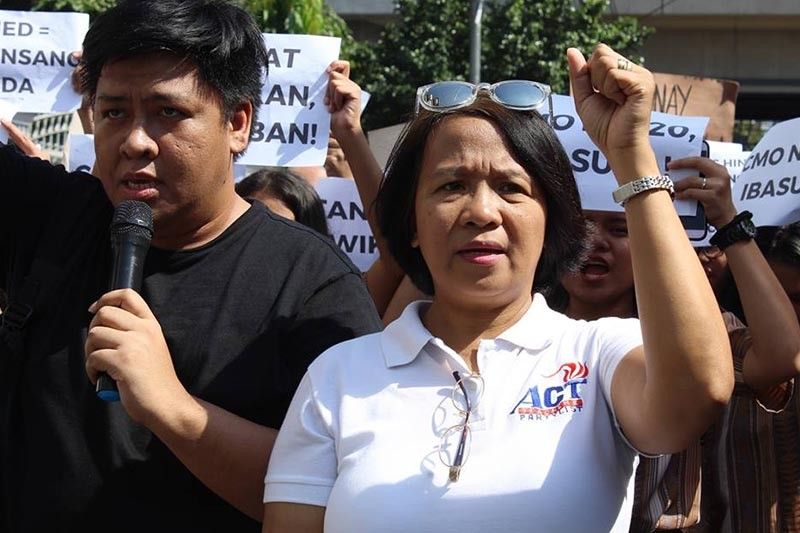
MANILA, Philippines — Rep. France Castro (ACT-Teachers Party-list) asked the Department of Justice (DOJ) to dismiss the fiscal’s resolution after the Quezon City prosecutor junked the grave threat charges against former President Rodrigo Duterte.
In a petition for review filed before the DOJ on Monday, Castro asked the department to “nullify” and “set aside” the dismissal of charges by the prosecutor on the grave threat raps under the Revised Penal Code (RPC) in relation to the Cybercrime Prevention Act against Duterte.
“Complainant-Appellant Castro respectfully prays that in the interest of substantive and procedural due process, this Honorable Office annul and set aside the Assailed Resolution and, in lieu thereof, render a Resolution finding probable cause against Respondent-Appellant Duterte and directing the Quezon City Office of the City Prosecutor to file the Information against the Respondent-Appellant,” Castro’s petition read.
In a separate statement, Castro said that the decision of the prosecutor sets a precedent of selectively interpreting statements, potentially extending protection to public figures who make violent remarks or casually red-tag others in the media.
“This undermines efforts to address online threats, contributes to normalizing violent rhetoric, and erodes public trust in the legal system’s ability to handle explicit threats from those in power, effectively deterring dissent,” Castro said in a statement.
In a resolution dated January 9, the QC prosecutor’s office dismissed Castro’s complaint against the former president for “want of sufficient evidence.”
The prosecutor’s office said that Duterte’s statements were not intentionally made and “lacks seriousness.”
“The fact that the respondent made so much preliminaries, side stories, comments and even interjecting sarcastic jokes in between and using terms in jest and in banter with the program host Apollo Quiboloy only indicates that he is not that serious enough to really execute and materialize the threats allegedly conceived in his mind,” the January 9 resolution read.
The death threats being referred to are the pronouncements made by the former president on Oct. 11, 2023 and Nov. 16, 2023 in his program “Gikan sa Masa, Para sa Masa” co-hosted by FBI’s most-wanted Apollo Quiboloy on Sonshine Media Network International (SMNI).
Duterte made the pronouncements after Castro criticized his daughter Vice President Sara Duterte’s confidential and intelligence funds (CIF). The former president said that Castro would be the “first target” of his daughter’s CIF.
The program is currently dismissed by the Movie Television and Review and Classification Board due to the death threats, while SMNI has been suspended indefinitely by the National Telecommunications Commission for the network’s non-compliance with the initially imposed 30-day suspension.
Meanwhile, in her plea, Castro said that the prosecutor had erred in dismissing the charges without legal basis as it downplayed the former president’s death threats as “mere advice and suggestion.”
“A careful examination of said subject utterances reveals that Respondent-Appellee Duterte had not intended to mean the opposite of what he wanted to say. The sensitive subject of confidential funds amounting to hundreds of millions of pesos to fund the killing of a public official whom the Respondent-Appellee wanted to be killed first is not, by any stretch of the imagination, a mere opinion or sarcasm,” the petition read.
The lawmaker also said that Duterte’s pronouncements can be qualified under grave threats as defined by the RPC as it established all the elements of the crime.
“The actus reus – – which is the actual and repetitive utterances of the threats of killing or death of Complainant – – clearly exists,” Castro’s petition read.
Castro also argued that the QC prosecutor “disregarded” the value of the electronic evidence submitted.
The QC prosecutor, in the resolution dismissing the lawmaker’s complaint, also said that the videos posted online had not gone through “proper authentication” as Castro did not “obtain the necessary authentication or certification from Facebook, YouTube or the SMNI.”
In response, Castro said that Duterte admitted the existence of the videos which makes the evidence valid, citing the Rules on Electronic Evidence.
“There is no dispute between the parties as to the integrity and authenticity of the submitted subject videos,” the petition read.
“As to the method of authentication, Section 1, Rule 9 of the Rules on Electronic Evidence provides that ‘all matters relating to the admissibility and evidentiary weight of an electronic document may be established by an affidavit stating the facts of direct personal knowledge of the affiant or based on authentic records,’” it added. — Ian Laqui
*****
Credit belongs to: www.philstar.com
 Atin Ito First Filipino Community Newspaper in Ontario
Atin Ito First Filipino Community Newspaper in Ontario






